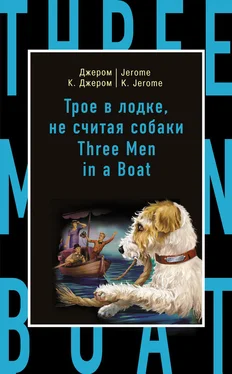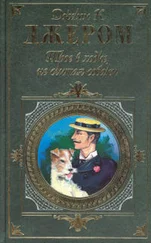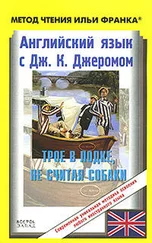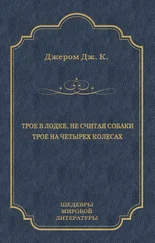“You think he would be upset,” she queried, “if I gave a man a sovereign to take them away and bury them?”
I answered that I thought he would never smile again.
An idea struck her. She said:
“Do you mind keeping them for him? Let me send them round to you.”
“Madam,” I replied, “for myself I like the smell of cheese, and the journey the other day with them from Liverpool I shall ever look back upon as a happy ending to a pleasant holiday. But, in this world, we must consider others. The lady under whose roof I have the honour of residing is a widow, and, for all I know, possibly an orphan too. She has a strong, I may say an eloquent, objection to being what she terms ‘put upon [13].’ The presence of your husband’s cheeses in her house she would, I instinctively feel, regard as a ‘put upon’; and it shall never be said that I put upon the widow and the orphan.”
“Very well, then,” said my friend’s wife, rising, “all I have to say is, that I shall take the children and go to an hotel until those cheeses are eaten. I decline to live any longer in the same house with them.”
She kept her word, leaving the place in charge of the charwoman, who, when asked if she could stand the smell, replied, “What smell?” and who, when taken close to the cheeses and told to sniff hard, said she could detect a faint odour of melons. It was argued from this that little injury could result to the woman from the atmosphere, and she was left.
The hotel bill came to fifteen guineas; and my friend, after reckoning everything up, found that the cheeses had cost him eight-and-sixpence a pound. He said he dearly loved a bit of cheese, but it was beyond his means; so he determined to get rid of them. He threw them into the canal; but had to fish them out again, as the bargemen complained. They said it made them feel quite faint. And, after that, he took them one dark night and left them in the parish mortuary. But the coroner discovered them, and made a fearful fuss.
He said it was a plot to deprive him of his living by waking up the corpses.
My friend got rid of them, at last, by taking them down to a sea-side town, and burying them on the beach. It gained the place quite a reputation. Visitors said they had never noticed before how strong the air was, and weak-chested and consumptive people used to throng there for years afterwards.
Fond as I am of cheese, therefore, I hold that George was right in declining to take any.
“We shan’t want any tea,” said George (Harris’s face fell at this); “but we’ll have a good round, square, slap-up [14]meal at seven – dinner, tea, and supper combined.”
Harris grew more cheerful. George suggested meat and fruit pies, cold meat, tomatoes, fruit, and green stuff. For drink, we took some wonderful sticky concoction of Harris’s, which you mixed with water and called lemonade, plenty of tea, and a bottle of whisky, in case, as George said, we got upset.
It seemed to me that George harped too much on the getting-upset idea. It seemed to me the wrong spirit to go about the trip in.
But I’m glad we took the whisky.
We didn’t take beer or wine. They are a mistake up the river. They make you feel sleepy and heavy. A glass in the evening when you are doing a mouch [15]round the town and looking at the girls is all right enough; but don’t drink when the sun is blazing down on your head, and you’ve got hard work to do.
We made a list of the things to be taken, and a pretty lengthy one it was, before we parted that evening. The next day, which was Friday, we got them all together, and met in the evening to pack. We got a big Gladstone [16]for the clothes, and a couple of hampers for the victuals and the cooking utensils. We moved the table up against the window, piled everything in a heap in the middle of the floor, and sat round and looked at it.
I said I’d pack.
I rather pride myself on my packing. Packing is one of those many things that I feel I know more about than any other person living. (It surprises me myself, sometimes, how many of these subjects there are.) I impressed the fact upon George and Harris, and told them that they had better leave the whole matter entirely to me. They fell into the suggestion with a readiness that had something uncanny about it. George put on a pipe and spread himself over the easy-chair, and Harris cocked his legs on the table and lit a cigar.
This was hardly what I intended. What I had meant, of course, was, that I should boss the job, and that Harris and George should potter about under my directions, I pushing them aside every now and then with, “Oh, you – !” “Here, let me do it.” “There you are, simple enough!” – really teaching them, as you might say. Their taking it in the way they did irritated me. There is nothing does irritate me more than seeing other people sitting about doing nothing when I’m working.
I lived with a man once who used to make me mad that way. He would loll on the sofa and watch me doing things by the hour together, following me round the room with his eyes, wherever I went. He said it did him real good to look on at me, messing about. He said it made him feel that life was not an idle dream to be gaped and yawned through, but a noble task, full of duty and stern work. He said he often wondered now how he could have gone on before he met me, never having anybody to look at while they worked.
Now, I’m not like that. I can’t sit still and see another man slaving and working. I want to get up and superintend, and walk round with my hands in my pockets, and tell him what to do. It is my energetic nature. I can’t help it.
However, I did not say anything, but started the packing. It seemed a longer job than I had thought it was going to be; but I got the bag finished at last, and I sat on it and strapped it.
“Ain’t you going to put the boots in?” said Harris.
And I looked round, and found I had forgotten them. That’s just like Harris. He couldn’t have said a word until I’d got the bag shut and strapped, of course. And George laughed – one of those irritating, senseless, chuckle-headed, crack-jawed laughs of his. They do make me so wild.
I opened the bag and packed the boots in; and then, just as I was going to close it, a horrible idea occurred to me. Had I packed my tooth-brush? I don’t know how it is, but I never do know whether I’ve packed my tooth-brush.
My tooth-brush is a thing that haunts me when I’m travelling, and makes my life a misery. I dream that I haven’t packed it, and wake up in a cold perspiration, and get out of bed and hunt for it. And, in the morning, I pack it before I have used it, and have to unpack again to get it, and it is always the last thing I turn out of the bag; and then I repack and forget it, and have to rush upstairs for it at the last moment and carry it to the railway station, wrapped up in my pocket– handkerchief.
Of course I had to turn every mortal thing out now, and, of course, I could not find it. I rummaged the things up into much the same state that they must have been before the world was created, and when chaos reigned. Of course, I found George’s and Harris’s eighteen times over, but I couldn’t find my own. I put the things back one by one, and held everything up and shook it. Then I found it inside a boot. I repacked once more.
When I had finished, George asked if the soap was in. I said I didn’t care a hang whether the soap was in or whether it wasn’t; and I slammed the bag to and strapped it, and found that I had packed my tobacco-pouch in it, and had to re-open it. It got shut up finally at 10.5 p.m., and then there remained the hampers to do. Harris said that we should be wanting to start in less than twelve hours’ time, and thought that he and George had better do the rest; and I agreed and sat down, and they had a go.
Читать дальше
Конец ознакомительного отрывка
Купить книгу









